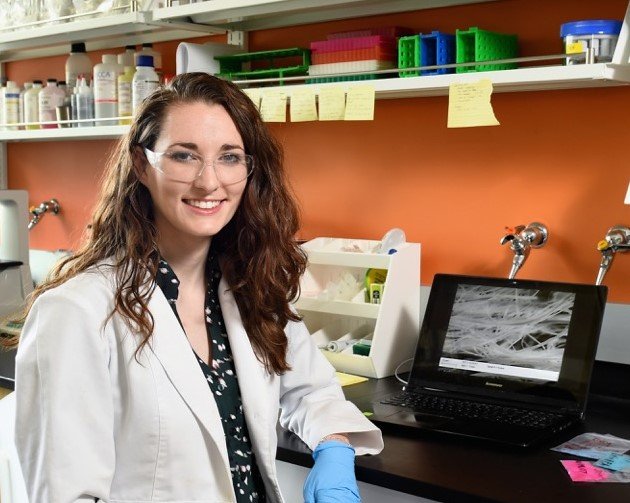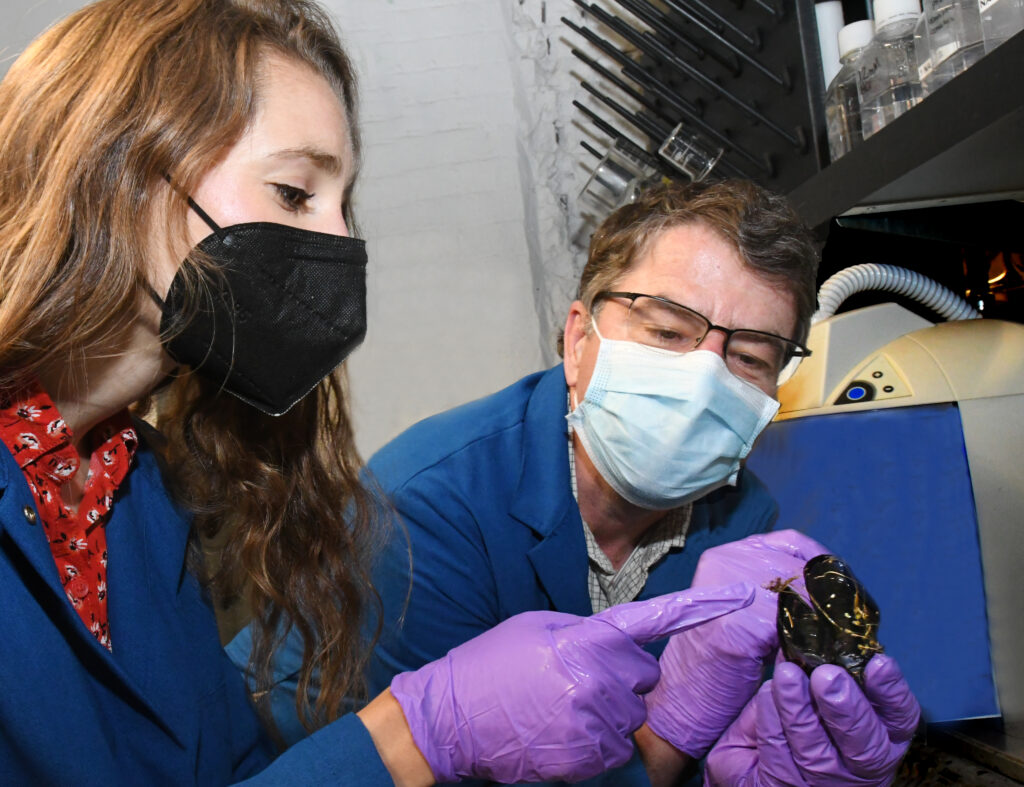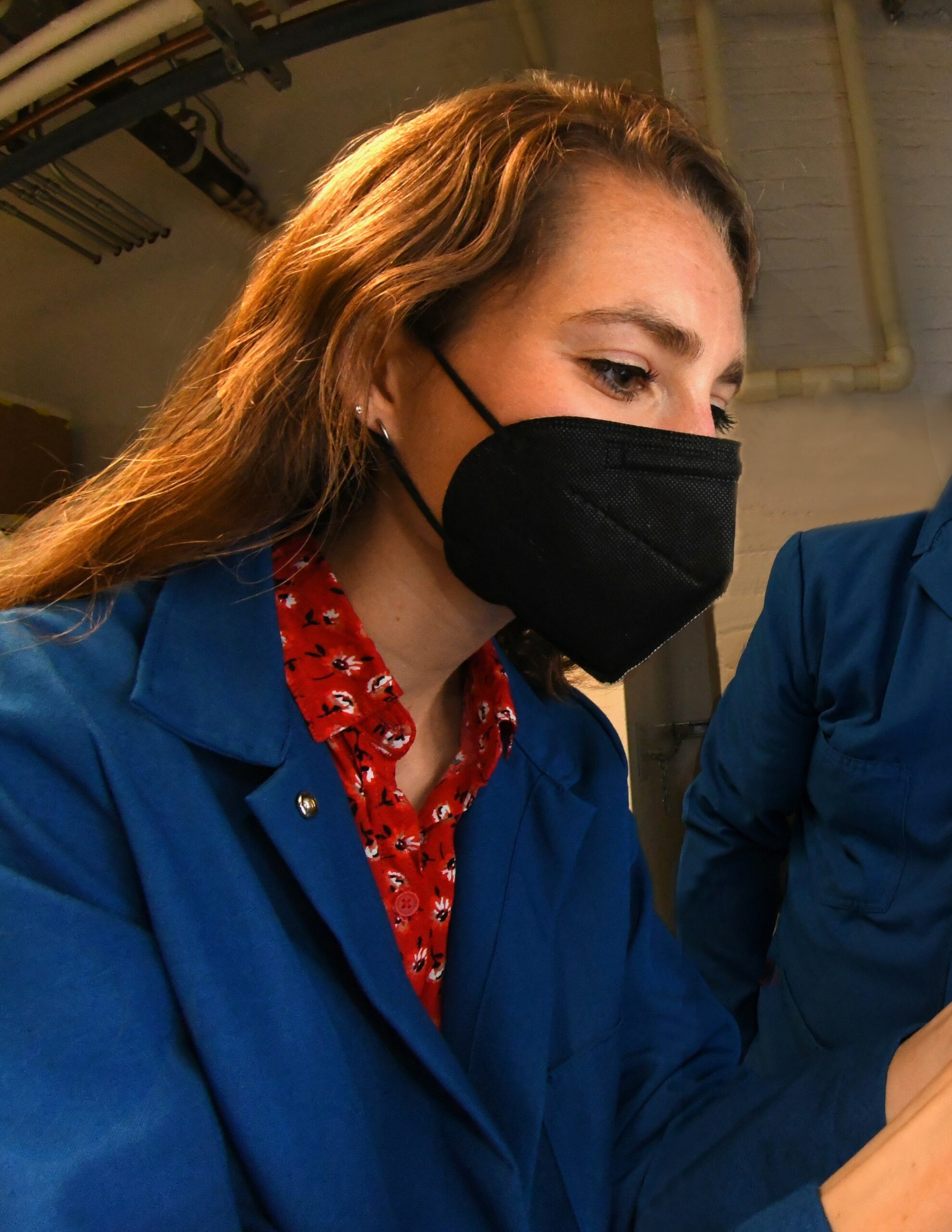
Entrepreneurial Journeys
Innovation FellowsHow a Bakar Fellow is Using Mussels to Treat Disease
By: Niki Borghei
Background
What do mussels and inflammatory bowel disease have in common? Probably not what you think.
Inflammatory bowel disease (IBD) is a chronic disease that is characterized by the formation of inflammatory ulcers throughout the gastrointestinal tract. Many treatments for IBD aim to reduce inflammation but do little to promote bowel repair. That is why Kelsey DeFrates, PhD student in the UC Berkeley-UCSF program in bioengineering and researcher in the Messersmith laboratory, is finding a solution.

Previously, their laboratory had identified a small molecule drug that was shown to improve wound healing and regeneration in mice. Therefore, to fulfill the unmet clinical need for a reparative treatment option for IBD, Kelsey aims to deliver this drug locally to ulcers associated with the disease. To do this, she is working to design a new carrier for the drug that would allow it to stick to the mucus lining of the intestines using mussel-inspired materials.
This year, their laboratory was given the Spark Award from the Bakar Fellows Program, which has supported development and testing of their new drug and delivery vehicles.
“As a Bakar Fellow, I have had the opportunity to network with other talented students and became aware of many entrepreneurial resources on campus I did not know existed,” she said. “I am looking forward to the opportunity to attend workshops and talks throughout the year to learn how I can move the technology I am developing in our laboratory into the real world.”
In addition to being an Innovation Fellow in the Bakar Fellows Program, Kelsey was recently named a Siebel Scholar, which recognizes the most talented students at 29 graduate schools of business, computer science, bioengineering, and energy science in the United States, China, France, Italy, and Japan.
“It is such a privilege to join this group of amazing scientists, engineers, and young professionals. I would like to thank Thomas and Stacey Siebel for their generosity and commitment to philanthropy.”
Motivation
Hard work and dedication are important, but Kelsey’s passion for science is what has driven her incredible success as a scientist.
“I have always loved science!” she said. “As a kid, I was always running at-home experiments with my junior scientist kits or sneaking bugs into the house to inspect under my toy microscope. Even though my parents did not come from a STEM background, they were incredibly supportive of my passion, and I was lucky to have a few amazing teachers throughout elementary and high school who introduced me to engineering.”
Kelsey’s childhood passion has culminated in research that has the potential to help those suffering from a life-debilitating disease. However, it was her undergraduate experience at Rowan University that sparked her interest in entrepreneurship.
“During my undergraduate studies at Rowan University, our professors within the College of Engineering and College of Business did a great job of forging relationships between the two programs. I had the opportunity to take classes that challenged me to leverage my technical expertise to come with a new product and then develop a business plan for its hypothetical commercialization. I think this type of exercise really improves my research, because it forces me to establish realistic project goals and reminds me of the impact of my work beyond academia. In my graduate studies, I have also had the opportunity to take entrepreneurship classes in my own department and Haas. The Bay Area is often regarded as the birthplace of biotechnology, so it has been incredibly inspiring to witness all the innovation happening around me,” she explained.
Through entrepreneurship, she is excited to have the opportunity to push the boundaries of her field while simultaneously improving the lives of others.
“The intellectual challenges accompanying innovation and discovery are thrilling, and I am humbled by my potential to one day invoke real societal change. I also love how engrained teamwork and collaboration is in the early stages of a research project or start-up. I have always learned the most and had the most fun working with interdisciplinary teams.”
Areas of Research
The Messersmith laboratory has a long history in bioinspired design, which Kelsey believes is a beautiful and creative way to approach research. Her adviser, Phil Messersmith, encourages them to stay curious and search for interesting materials throughout nature but remain practical in their execution in the lab. A great example of this is the laboratory’s work with mussel-inspired adhesives. By secreting special protein threads, mussels can stick to rocky shorelines with remarkable strength. For years, the group has been creating synthetic materials with similar chemistries to these sticky proteins to be used as tissue adhesives and industrial glues. When she joined the laboratory, she was interested in combining this expertise with some additional work the lab had been doing in drug delivery and tissue regeneration.
Currently, IBD is a life-long debilitating disease, afflicting over 1.6 million Americans. She hopes that this research establishes a new therapy that reduces disease relapse and severity or establishes a new pro-regenerative goal for treatment outcomes. By developing mucoadhesive delivery vehicles, she also thinks that this research has the potential to revolutionize drug delivery to the gastrointestinal tract.
Where it Leads
“One day, I aspire to lead my own academic laboratory and work with students to engineer new biomaterials that can be used in drug delivery or regenerative medicine,” said Kelsey. “To bridge the gap between academic research and clinical translation, I hope to spin our new technologies out of the laboratory and establish biotechnology companies with my students. At UC Berkeley, the work done through the Bakar BioEnginuity Hub has been a great example as to how to accomplish this goal.”
“As a first-generation college student and woman in STEM, sometimes I feel an obligation to go above and beyond to earn respect from my peers and overcome my own feelings of imposter syndrome. Especially early in my career, I found it difficult to navigate the throes of college admission and academia without an immediate role model. As I progressed throughout my studies, at times, I found it difficult to relate to my peers, many of whom came from more elite backgrounds, and alienated from both my former family and friends. At Rowan University, however, I was fortunate enough to have professors who came from similar backgrounds to my own and understood my struggles. After seeing everything they were able to accomplish, I gained confidence in my own abilities in the laboratory and classroom. Today, I still reach out to these mentors for advice and have added more supporters, such as my PI Phil Messersmith at UC Berkeley.”
While Kelsey had to undergo many hardships to get to where she is today, her experience has fueled her dream for a more inclusive future, which she aims to prioritize in her own career.
“Adequate representation in higher education is instrumental to student success. While I was lucky enough to find professors I could relate to, many students from under-represented groups do not. For example, less than one-quarter of fulltime faculty in the US identify as nonwhite, a figure that simply does not reflect the student body they serve. In my career, I hope to do my part to improve matters of diversity, equity, and inclusion in STEM by championing my peers from unconventional backgrounds and engaging with younger students from under-served demographics.”
